Our motto: Hike more, worry less…
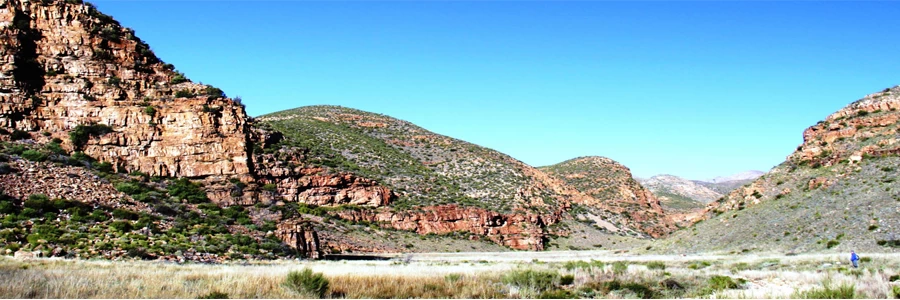
About
The Leopard Trail is a 4-day and 3-night hike set in the magnificent Baviaanskloof World Heritage Site Wilderness Reserve. This is a slackpacking hike – each day we transport your bags and food from one overnight hut to the next, leaving you to walk with only a day pack.
The Leopard Trail is a moderately difficult hike with the longest day being 22km. The route is designed for people of good hiking fitness.
A maximum of 12 hikers is permitted on the trail at a time. The minimum number is 4.
Please note that currently, the Eastern Cape is experiencing a drought, so do not expect to find water on route. There are plunge pools and fresh water tanks at each overnight site. Cedar Falls does have water.
Trails
Slack-Packing the Leopard Trail
We transport your bags so you can walk with just a day pack with the essentials for a days hike. You are provided plastic boxes, and we recommend that you put everything you want transported inside the boxes. These protect your belongings from rubbing and bouncing on the rough roads between the overnight sites. We recommend you do not put valuables such as laptops and cameras in your bags – rather leave them in your car at the Base Camp where they will be safe, or carry them with you. Dimensions for the boxes are 465mm x 736mm, and 350mm deep.
Bag Drop off times: Our aim is to ensure that those on the last day of the trail and planning to leave by lunch time get their bags in good time. Our schedule for dropping off bags looks like this: (sometimes they may be a little late or early – our vehicle travels rough terrain, and we may have to wait for a hiker or two). Camp 1: 3pm. Camp 2: 4pm. Camp 3: 11am. Base Camp Final Day delivered to the reception area: Noon.
Overnight Sites
Our overnight sites each have a three sleeping huts (sleeping 4 per hut) and one central catering hut. The catering huts are there to give you a communal space for your group to hang out, make food, swim in the pool filled with mountain water and have a great time with your hiking mates. Inside each catering hut are gas stove tops, cooking and eating utensils – no need to bring those along. Each site has a braai area and braai grid. Each site has a splash pool.
The sleeping huts have mattresses – all you need is a sleeping bag and pillow. If you are going to sleep outside of your sleeping bag, or open it up, you will need to bring a single sheet to cover the mattress.
The nights are very dark and no lamps are provided, so torches and headlamps are required. No open flames such as candles are allowed in the huts.
You will need to clean all the kitchen equipment and utensils before leaving in the morning – the next group of hikers will appreciate it.
Each campsite has a flush toilet, and cold showers.
Water
There are water tanks at each overnight campsite that provide water for drinking, cooking, washing dishes, and cold water showers. This water is piped in from the nearest mountain streams and is good to drink. Depending on the season and local rainfall, you may be lucky and find streams and springs along the length of The Leopard Trail. Currently, the Eastern Cape is experiencing a drought, so do not expect to find water on route. However, each campsite has a small pool with mountain water.
Fires
Fires are only allowed in the fire places provided. Firewood is provided. Please do not collect wood from the natural environment. Dead bushes and branches provide important habitat for a wide variety of insects and animals, and are a vital part of the fire load in the veld for natural burning cycles.
This is a high-risk fire area. Please ensure that your fires and coals are completely doused any time you leave the fire area – at night and in the morning. Water is provided for this purpose.
Important Safety Considerations
There is no cell phone reception on the trail, and very little vehicle access, so it is difficult to let us know of emergencies in a hurry. This is a risk you accept when walking the Leopard Trail.
The Leopard Trail goes through natural wilderness with all the risks associated with wild animals, snakes, insects, unpredictable weather and a strenuous hike. Carry the following safety items with you: first aid kit, survival bag, thermal blanket.
In the event of an emergency, ensure that someone remains with the person/people affected while at least two people return to Base Camp or the nearest emergency exit. The route from each campsite to the nearest emergency exit is marked.
- From Camp 1 a 2.6 km trail leads to the main Baviaanskloof Road.
- From Camp 2 a 1.1 km trail leads to Base Camp.
- From Camp 3 a 3.2 km trail leads to the main Baviaanskloof Road and Reserve Ranger’s house.
In the event of mountain fires or floods, stay together and use your best judgement as to the safest course of action. We will be doing our best to come to your aid. Seek natural shelter and avoid high areas during dangerous weather such as thunderstorms.
The area has a variety of venomous snakes, including puffadders and Cape cobra. Refresh your knowledge of how to handle snake/spider bites and scorpion stings.
Leopard spoor is often seen on the trail, and very occasionally you may catch a glimpse of one of these shy creatures during the day. There are no rhino or buffalo in our part of the Baviaanskloof Mega Reserve.
Baboons in the area still have their natural caution and fear of humans. They will move away when they see hikers. They do not come to the campsites looking for human food. Your support and cooperation in this regard is very important. Please do not feed the baboons. Do not leave food out or throw scraps into the bushes. When you leave the campsites each morning, ensure that the rubbish bins, as well as the bins in which your food is being transported, have been closed with the cable ties provided.
When to Hike and the Weather
The Leopard Trail is a great hike at any time of year.
Summer is hot with the daily average in December, January and February at 26 degrees Celsius. Days can get up to the high 30s, so be prepared to walk in the early mornings and late afternoons, spending your midday hours at the lunchtime mountain pools. Each camp has a pool with clear mountain water, making a summer hike a great opportunity to hike early and spend the day swimming and relaxing at the camp sites.
Autumn and Spring (March, April, May, September, October and November) can provide great fair weather hiking, with average temperatures in the early 20s. As winter approaches, an occasional cold front will blow through, dropping temperatures considerably. The swimming pools are great on the hot days, while the fire places inside the communal huts keep you warm on cold days. The flowers in Spring are spectacular on the trail.
Winter is a favorite for many hikers with cool days hiking if you don’t like the heat. The fire places in the communal hut are a winner, with groups gathering together around the fire with warm drinks and good times. Temperatures in June, July and August average around 16 degrees Celsius. Nights drop to zero though, so make sure you have a warm sleeping bag to sleep well on our great mattresses.
Rain in the Baviaanskloof is an unpredictable affair. All months of the year have only around 4 days of rain so, statistically, your chances of dry weather are pretty good.
Like all mountain areas, the Baviaanskloof can experience a range of weather conditions over any 4-day period. You are advised to prepare for rain, wind, cold and heat.
Age and Fitness
The Leopard Trail is a relatively difficult hike, with the longest day being 20km. The hike is designed for people of good hiking fitness. Unfit hikers should not attempt the trail.
The recommended age range of 12 to 65 years is used as indicative, due to the physical demands of the trail. We will not stop hikers outside of this age range except children under the age of 6 – but encourage you to be realistic about your own ability and limits. All hikers 6 to 12 years of age must be accompanied by their parents/guardians who will be legal signatories to Indemnity Forms (to be submitted with copies of their identity document or passport at The Leopard Trail reception desk before undertaking the trail). There are relatively steep ascents and descents, so please be cautious if you have previously injured your ankles and/or knees.
DAY 1
9.75km, 3 – 5 hours
The first day of the trail is 9.75km, so please ensure you start walking by 2pm at the latest. The trail begins with a nice stiff walk up Kick-Start Hill to the plateau. At the day’s halfway point there is an optional detour to Gabriel’s Pools – a spectacular kloof with small pools for swimming and your only drinking water along the path for the day. The detour is 570 metres each way, and with time for swimming will add an extra hour to the day’s hike. From there the path moves down into a valley that winds its way to the first overnight spot.
Our recommendation: Give yourself enough time to do the detour. Gabriel’s Pools are in a really special little kloof.
DAY 2
18 km, 5 – 8 hours
Day 2 starts off nice and easy with a 5.5 km walk along Rhebok Valley. The valley ends at an optional detour (314 metres each way) to the Cedars Viewpoint, passing a stream with drinking water and a small pool to swim in. From the detour turn-off point you start the climb to the top of the saddle and spectacular views of the Kouga and Baviaans foothills. Down the other side to Reflection Pools, for a swim and drinking water. The remainder of the day’s hike takes you across the landscape before climbing two small saddles at the end and arriving at the overnight huts.
Our recommendation: In summer avoid walking during the middle of the day. Organise yourselves the night before for an early departure. Leave early in the morning (as close to daybreak as possible), enjoy the detour to Cedar Viewpoint, and keep moving to get to Reflection Pools and shade by mid morning. Spend a good few hours at the pools before heading off mid afternoon for the last few hours of the walk. Bags for Camp 2 are delivered last, so if you arrive at the camp site early be prepared to wait for your bags to arrive.
DAY 3
22 km, 6 – 9 hours
The longest day of the trail, day 3 starts with you walking across the flow of the landscape. This is the most taxing part of the hike as you tackle the three climbs of Honeybush Hill, Inconvenient Truth and Ain’t so Bad. This is true wilderness, with no sign of human impact, and views deep into the Baviaans and Kouga mountains. At the day’s halfway point, Draaipunt, there is a short 224 metre detour to drinking water. The second half of the day is spent walking down the incredibly beautiful Kasey Kloof, following its winding path for 9 km through to the third overnight huts.
Our recommendation: Leave as early as possible in summer and get over the three saddles in the first few hours of the day (prepare your camp the night before for a sunrise departure.) Spend some time at the stream at Draaipunt before continuing. The walk through Kasey Kloof in the second half of the day is a lot cooler, often passing through shaded areas and under trees. Depending on the localized rains, there are often places in Kasey Kloof to sit in the shade with your feet in running water.
DAY 4
13km, 3 – 5 hours
An easy start to the day has you following yet another beautiful kloof, Birdsong Valley. After 4km you get to Fond Farewell, a steep climb to the plateau. Once on the plateau you will need to get through The Cauldron, a series of two small valleys that get very hot in summer. From there it is a steep descent into the Cedar Falls valley, which brings you towards base camp for a traditional swim in the reservoir’s clean mountain water.
Our recommendation: Take time to enjoy the last morning of your walk, being conscious of the spectacular valley, listening to the birds and keeping your eyes open for kudu, rhebuck and klipspringers. This is your last day on the trail, and the world out there awaits. Try to make it wait just a little longer.
Gallery:
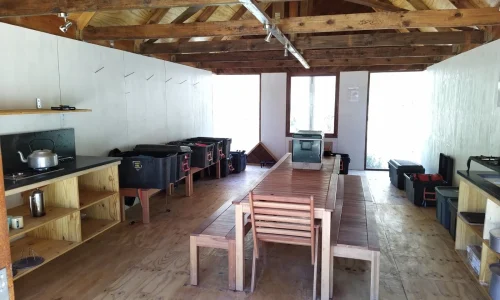
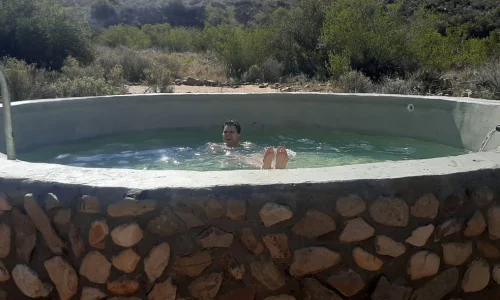
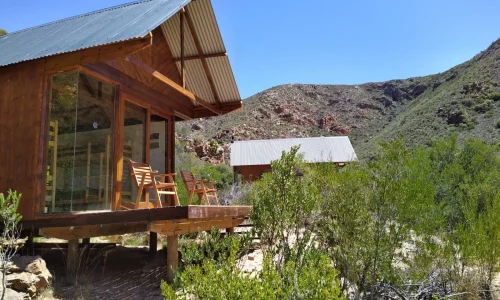
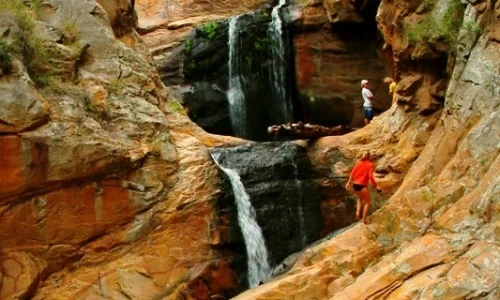
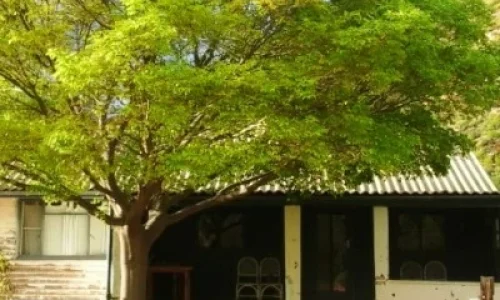
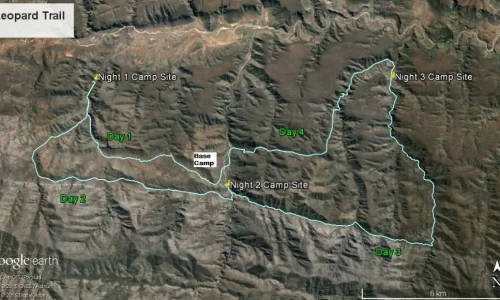
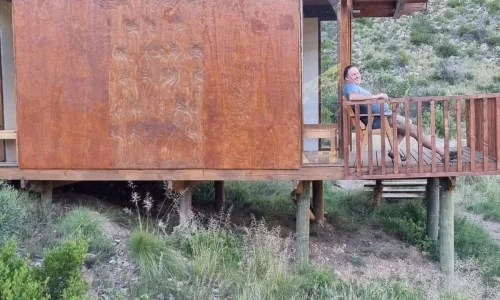
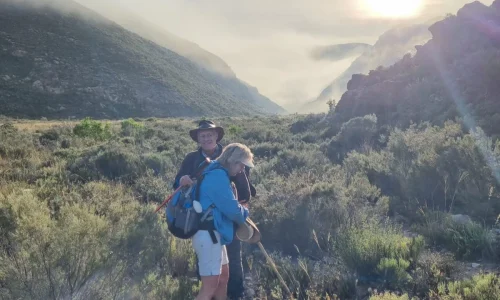
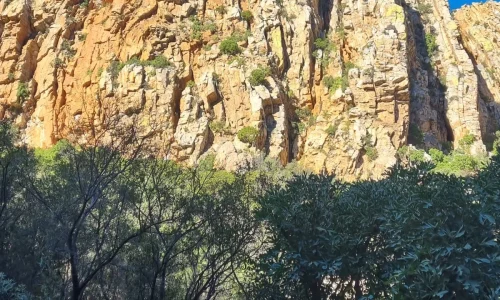
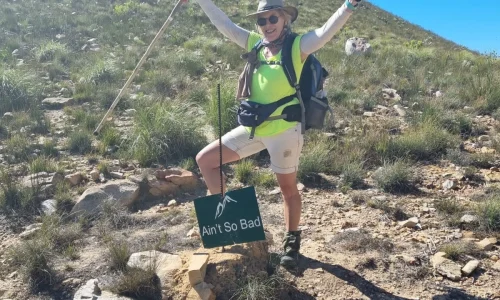
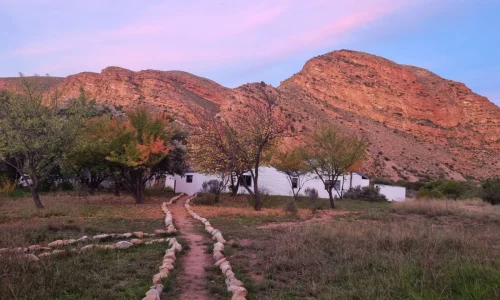
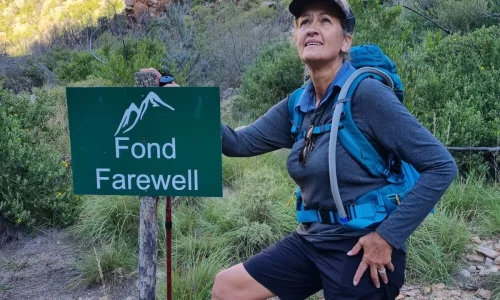
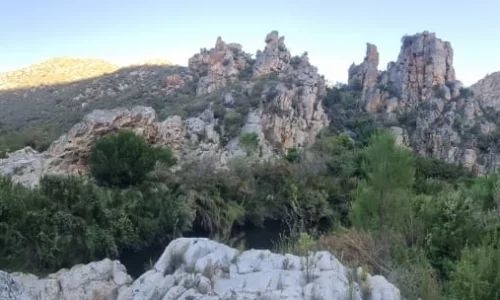
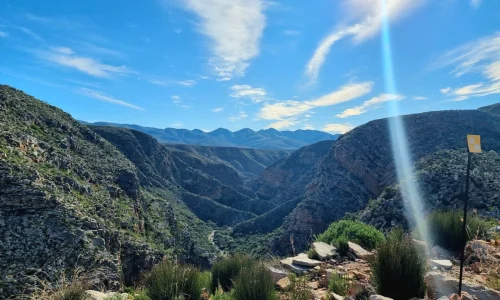
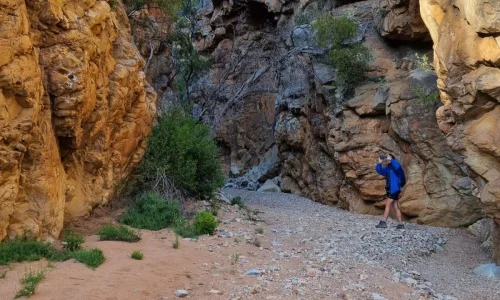
Price Available On Request
Contact 082 663 6168 or 064 523 1807
Email info@ecotrail.co.za
Disclaimer
All information adapted with permission of owner
